193 books about Reflections and 8
start with O
193 books about Reflections and 8
193 books about Reflections
8 start with O start with O
8 start with O start with O
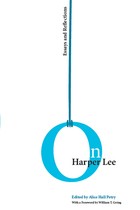
On Harper Lee
Essays and Reflections
Alice Hall Petry
University of Tennessee Press, 2008
Harper Lee's Pulitzer Prize-winning novel To Kill a Mockingbird remains one of the most enduring works of southern fiction ever written. Although a literary phenomenon-tens of millions of copies sold worldwide-there is surprisingly little secondary literature on Lee and her only novel. On Harper Lee: Essays and Reflections is the first collection of original essays on the author and her magnum opus.
On Harper Lee is an eclectic combination of academic and familiar essays. John Carlos Rowe discusses economic issues in the novel; Jacqueline Tavernier-Courbin looks at Lee's handling of humor; Robert Butler examines the novel within the context of Christian religious allegory; Jean Frantz Blackall traces the similarities between To Kill a Mockingbird and the novels of Lee's favorite author, Jane Austen; and Kathryn Lee Seidel examines how the character of Scout comes to approximate the ideals of Stoicism embodied in her father, Atticus Finch.
In what is perhaps the most controversial chapter in the collection, Laura Fine examines how To Kill a Mockingbird follows the pattern of lesbian coming-of-age fiction, arguing that the subtext “is the drama of Scout herself, of her conflicted private hopes to be accepted as an outsider.” Likewise controversial Lesley Marx recounts the reaction to Lee's novel in her native South Africa. Because Mockingbird holds such tremendous personal appeal for so many readers, Petry has included three familiar essays by noted writers Doris Betts, Gerald Early, and Nichelle D. Tramble.
Written for scholars as well as general readers, On Harper Lee is an accessible collection on one of America's most important novels and its often enigmatic creator.
On Harper Lee is an eclectic combination of academic and familiar essays. John Carlos Rowe discusses economic issues in the novel; Jacqueline Tavernier-Courbin looks at Lee's handling of humor; Robert Butler examines the novel within the context of Christian religious allegory; Jean Frantz Blackall traces the similarities between To Kill a Mockingbird and the novels of Lee's favorite author, Jane Austen; and Kathryn Lee Seidel examines how the character of Scout comes to approximate the ideals of Stoicism embodied in her father, Atticus Finch.
In what is perhaps the most controversial chapter in the collection, Laura Fine examines how To Kill a Mockingbird follows the pattern of lesbian coming-of-age fiction, arguing that the subtext “is the drama of Scout herself, of her conflicted private hopes to be accepted as an outsider.” Likewise controversial Lesley Marx recounts the reaction to Lee's novel in her native South Africa. Because Mockingbird holds such tremendous personal appeal for so many readers, Petry has included three familiar essays by noted writers Doris Betts, Gerald Early, and Nichelle D. Tramble.
Written for scholars as well as general readers, On Harper Lee is an accessible collection on one of America's most important novels and its often enigmatic creator.
[more]
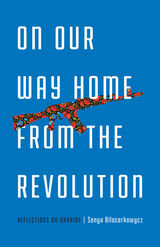
On Our Way Home from the Revolution
Reflections on Ukraine
Sonya Bilocerkowycz
The Ohio State University Press, 2019
In 2014 Sonya Bilocerkowycz is a tourist at a deadly revolution. At first she is enamored with the Ukrainians’ idealism, which reminds her of her own patriotic family. But when the romantic revolution melts into a war with Russia, she becomes disillusioned, prompting a return home to the US and the diaspora community that raised her. As the daughter of a man who studies Ukrainian dissidents for a living, the granddaughter of war refugees, and the great-granddaughter of a gulag victim, Bilocerkowycz has inherited a legacy of political oppression. But what does it mean when she discovers a missing page from her family’s survival story—one that raises questions about her own guilt?
In these linked essays, Bilocerkowycz invites readers to meet a swirling cast of post-Soviet characters, including a Russian intelligence officer who finds Osama bin Laden a few weeks after 9/11; a Ukrainian poet whose nose gets broken by Russian separatists; and a long-lost relative who drives a bus into the heart of Chernobyl. On Our Way Home from the Revolution muddles our easy distinctions between innocence and culpability, agency and fate.
In these linked essays, Bilocerkowycz invites readers to meet a swirling cast of post-Soviet characters, including a Russian intelligence officer who finds Osama bin Laden a few weeks after 9/11; a Ukrainian poet whose nose gets broken by Russian separatists; and a long-lost relative who drives a bus into the heart of Chernobyl. On Our Way Home from the Revolution muddles our easy distinctions between innocence and culpability, agency and fate.
[more]
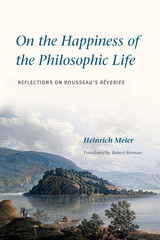
On the Happiness of the Philosophic Life
Reflections on Rousseau's Rêveries in Two Books
Heinrich Meier
University of Chicago Press, 2016
On the Happiness of the Philosophic Life presents Heinrich Meier’s confrontation with Rousseau’s Rêveries, the philosopher’s most beautiful and daring work, as well as his last and least understood. Bringing to bear more than thirty years of study of Rousseau, Meier unfolds his stunningly original interpretation in two parts.
The first part of On the Happiness of the Philosophic Life approaches the Rêveries not as another autobiographical text in the tradition of the Confessions and the Dialogues, but as a reflection on the philosophic life and the distinctive happiness it provides. The second turns to a detailed analysis of a work referred to in the Rêveries, the “Profession of Faith of the Savoyard Vicar,” which triggered Rousseau’s political persecution when it was originally published as part of Émile. In his examination of this most controversial of Rousseau’s writings, which aims to lay the foundations for a successful nonphilosophic life, Meier brings to light the differences between natural religion as expressed by the Vicar and Rousseau’s natural theology. Together, the two reciprocally illuminating parts of this study provide an indispensable guide to Rousseau and to the understanding of the nature of the philosophic life.
“[A] dense but precise and enthralling analysis.”—New Yorker
The first part of On the Happiness of the Philosophic Life approaches the Rêveries not as another autobiographical text in the tradition of the Confessions and the Dialogues, but as a reflection on the philosophic life and the distinctive happiness it provides. The second turns to a detailed analysis of a work referred to in the Rêveries, the “Profession of Faith of the Savoyard Vicar,” which triggered Rousseau’s political persecution when it was originally published as part of Émile. In his examination of this most controversial of Rousseau’s writings, which aims to lay the foundations for a successful nonphilosophic life, Meier brings to light the differences between natural religion as expressed by the Vicar and Rousseau’s natural theology. Together, the two reciprocally illuminating parts of this study provide an indispensable guide to Rousseau and to the understanding of the nature of the philosophic life.
“[A] dense but precise and enthralling analysis.”—New Yorker
[more]

On the Proper Dignity of Human Being
Notes and Reflections from the Later Heidegger
Sean Kelly
Harvard University Press
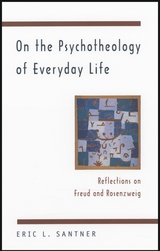
On the Psychotheology of Everyday Life
Reflections on Freud and Rosenzweig
Eric L. Santner
University of Chicago Press, 2001
In On the Psychotheology of Everyday Life, Eric Santner puts Sigmund Freud in dialogue with his contemporary Franz Rosenzweig in the service of reimagining ethical and political life. By exploring the theological dimensions of Freud's writings and revealing unexpected psychoanalytic implications in the religious philosophy of Rosenzweig's masterwork, The Star of Redemption, Santner makes an original argument for understanding religions of revelation in therapeutic terms, and offers a penetrating look at how this understanding suggests fruitful ways of reconceiving political community.
Santner's crucial innovation in this new study is to bring the theological notion of revelation into a broadly psychoanalytic field, where it can be understood as a force that opens the self to everyday life and encourages accountability within the larger world. Revelation itself becomes redefined as an openness toward what is singular, enigmatic, even uncanny about the Other, whether neighbor or stranger, thereby linking a theory of drives and desire to a critical account of sociality. Santner illuminates what it means to be genuinely open to another human being or culture and to share and take responsibility for one's implication in the dilemmas of difference.
By bringing Freud and Rosenzweig together, Santner not only clarifies in new and surprising ways the profound connections between psychoanalysis and the Judeo-Christian tradition, he makes the resources of both available to contemporary efforts to rethink concepts of community and cross-cultural communication.
Santner's crucial innovation in this new study is to bring the theological notion of revelation into a broadly psychoanalytic field, where it can be understood as a force that opens the self to everyday life and encourages accountability within the larger world. Revelation itself becomes redefined as an openness toward what is singular, enigmatic, even uncanny about the Other, whether neighbor or stranger, thereby linking a theory of drives and desire to a critical account of sociality. Santner illuminates what it means to be genuinely open to another human being or culture and to share and take responsibility for one's implication in the dilemmas of difference.
By bringing Freud and Rosenzweig together, Santner not only clarifies in new and surprising ways the profound connections between psychoanalysis and the Judeo-Christian tradition, he makes the resources of both available to contemporary efforts to rethink concepts of community and cross-cultural communication.
[more]
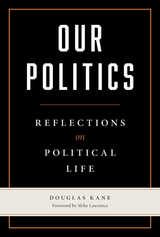
Our Politics
Reflections on Political Life
Douglas Kane, with a foreword by Mike Lawrence
Southern Illinois University Press, 2019
Douglas Kane, an American politician and economist, offers readers a straightforward, personal account of what it is like to run for and hold public office—the demands, conflicts, temptations, and rewards created by political, economic, and social forces. Throughout the book, Kane references Illinois and Wisconsin politics. The campaigns of his wife, Kathleen Vinehout, and her years in the Wisconsin senate show that the centralization of political power, the structure of campaign organizations, and the policy decisions that Kane experienced as an Illinois legislator are not unique to any one state.
In Our Politics Kane reflects on his nearly fifty years of active engagement in state and local politics. In a series of essays, he seeks to understand the forces, motivations, incentives and technologies that shape our politics and produce the consequences that we live with every day. He describes how candidates and officeholders deal with the fundamental contradictions inherent in the democratic process, and how and why the political power structure has changed. He also explores the personal experience of being a legislator, from deciding how to vote to building relationships with party leaders, fellow legislators, the governor, and the voters in the district. Kane concludes by considering the possibility of change, how it might happen, and the steps that candidates, political parties, activists and others might take to better our politics with results more to our liking.
While many journalists record politics from the outside, and numerous political memoirs focus on personalities and what happened to whom and when, this book gives an insider’s view of politics at the level of state government. This book is not about those politicians but about our politics, which together we have created and together we must deal with.
In Our Politics Kane reflects on his nearly fifty years of active engagement in state and local politics. In a series of essays, he seeks to understand the forces, motivations, incentives and technologies that shape our politics and produce the consequences that we live with every day. He describes how candidates and officeholders deal with the fundamental contradictions inherent in the democratic process, and how and why the political power structure has changed. He also explores the personal experience of being a legislator, from deciding how to vote to building relationships with party leaders, fellow legislators, the governor, and the voters in the district. Kane concludes by considering the possibility of change, how it might happen, and the steps that candidates, political parties, activists and others might take to better our politics with results more to our liking.
While many journalists record politics from the outside, and numerous political memoirs focus on personalities and what happened to whom and when, this book gives an insider’s view of politics at the level of state government. This book is not about those politicians but about our politics, which together we have created and together we must deal with.
[more]

Out in the Field
Reflections of Lesbian and Gay Anthropologists
Edited by Ellen Lewin and William L. Leap
University of Illinois Press, 1996
"Definitive and well-rounded. . . . Explores how anthropologists
manage issues of identity and sexuality in field research and professional
life. In an era when the field worker's positionality is critical to research
and ethnographic writing, this insightful book has much to say to gay
and straight researchers alike." -- Louise Lamphere, University of
New Mexico
"Addresses sensitive, controversial, and tabooed subjects. . . .
Out in the Field will be read by a variety of audiences, within
and outside of anthropology." -- Jean Jackson, Massachusetts Institute
of Technology
Lesbian and gay anthropologists write candidly in Out in the Field
about their research and personal experiences in conducting fieldwork,
about the ethical and intellectual dilemmas they face in writing about
lesbian or gay populations, and about the impact on their careers of doing
lesbian/gay research.
The first volume in which lesbian and gay anthropologists discuss personal
experiences, Out in the Field offers compelling illustrations of
professional lives both closeted and out to colleagues and fieldwork informants.
It also concerns aligning career goals with personal sexual preferences
and speaks directly to issues of representation and authority currently
being explored throughout the social sciences.
CONTRIBUTORS: Geoffrey Burkhart, Liz Goodman, Delores M. Walters, Walter
L. Williams, Sabine Lang, Ellen Lewin, William L. Leap, Ralph Bolton,
Elizabeth Lapovsky Kennedy, Madeline Davis, Will Roscoe, Esther Newton,
Stephen O. Murray, James Wafer, Kath Weston, Sue-Ellen Jacobs
manage issues of identity and sexuality in field research and professional
life. In an era when the field worker's positionality is critical to research
and ethnographic writing, this insightful book has much to say to gay
and straight researchers alike." -- Louise Lamphere, University of
New Mexico
"Addresses sensitive, controversial, and tabooed subjects. . . .
Out in the Field will be read by a variety of audiences, within
and outside of anthropology." -- Jean Jackson, Massachusetts Institute
of Technology
Lesbian and gay anthropologists write candidly in Out in the Field
about their research and personal experiences in conducting fieldwork,
about the ethical and intellectual dilemmas they face in writing about
lesbian or gay populations, and about the impact on their careers of doing
lesbian/gay research.
The first volume in which lesbian and gay anthropologists discuss personal
experiences, Out in the Field offers compelling illustrations of
professional lives both closeted and out to colleagues and fieldwork informants.
It also concerns aligning career goals with personal sexual preferences
and speaks directly to issues of representation and authority currently
being explored throughout the social sciences.
CONTRIBUTORS: Geoffrey Burkhart, Liz Goodman, Delores M. Walters, Walter
L. Williams, Sabine Lang, Ellen Lewin, William L. Leap, Ralph Bolton,
Elizabeth Lapovsky Kennedy, Madeline Davis, Will Roscoe, Esther Newton,
Stephen O. Murray, James Wafer, Kath Weston, Sue-Ellen Jacobs
[more]
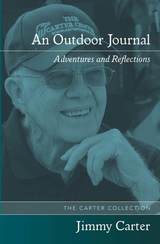
An Outdoor Journal
Adventures and Reflections
Jimmy Carter
University of Arkansas Press, 1994
An Outdoor Journal, first published in 1988, is President Carter’s memoir of hunting and fishing and the meaning of nature, revealing much about a man who embodies “so much of what Americans claim to admire—self-reliance, honesty, humor, modesty, intelligence—the stuff of heroes” (The New York Times Book Review).
[more]
READERS
Browse our collection.
PUBLISHERS
See BiblioVault's publisher services.
STUDENT SERVICES
Files for college accessibility offices.
UChicago Accessibility Resources
home | accessibility | search | about | contact us
BiblioVault ® 2001 - 2024
The University of Chicago Press









